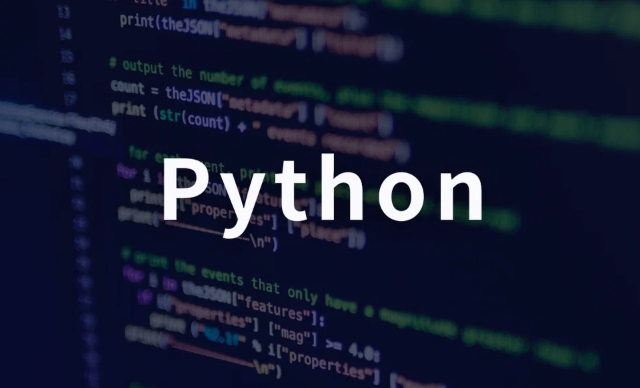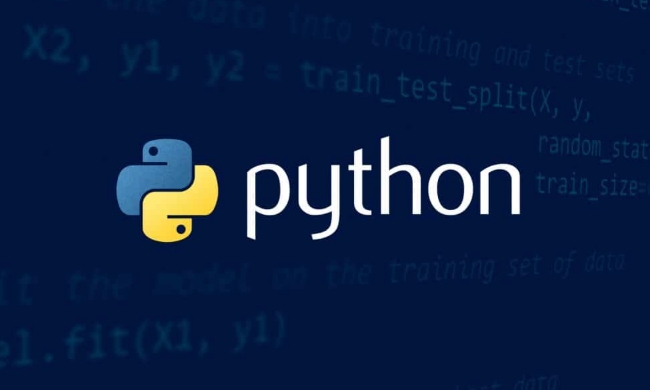How to use `@staticmethod` in python
@staticmethod is used in Python to define methods that do not depend on instances or classes themselves. Used when the function logic belongs to a class but does not need to access the class or instance properties, such as data verification, tool functions, etc. For example, the validate_phone method in the User class verifies the phone number format without accessing self or cls. The difference from conventional methods and @classmethod is that conventional methods automatically receive self as instance parameters, @classmethod receives cls as class parameters, while @staticmethod does not receive any implicit parameters. Practical applications include data verification, date processing, such as the is_leap_year method of the Date class, etc. Calling a static method can pass through a class or instance, but it cannot access self or cls within the method.

@staticmethod in Python is used to define a method that doesn't depend on the instance or the class itself. It's basically a way to organize functions inside a class that don't need access to self or cls .

When should you use @staticmethod ?
You'll want to use @staticmethod when you have a function that logically belongs to a class but doesn't actually need to access any class or instance attributes.

For example, imagine you're building a class for handling user data and you have a helper function that validates phone numbers — it doesn't need any info from the object or the class, just some input.
class User:
def __init__(self, name, phone):
self.name = name
self.phone = phone
@staticmethod
def validate_phone(phone):
return len(str(phone)) == 10 In this case, validate_phone isn't tied to a specific instance or class — it's just a utility function grouped under the class for better organization.

How is it different from regular methods and @classmethod ?
- Regular methods automatically take
selfas the first argument (the instance). -
@classmethodtakesclsas the first argument (the class), which is useful for factory methods. -
@staticmethoddoesn't take either — it behaves like a normal function, except it lives inside a class.
So if you're not accessing self or cls , go with @staticmethod .
Here's a quick comparison:
class Demo:
@staticmethod
def static_method(x):
Return x
def regular_method(self, x):
return self.xx
@classmethod
def class_method(cls, x):
return cls.__name__ str(x)Each of these decorators serves a different purpose. Use the right one based on whether your method needs access to the instance, the class, or neither.
Practical use cases for @staticmethod
- Data validation (like checking phone number format)
- Utility functions related to the class
- Helper functions that make sense inside the class but don't modify state
- Keeping code organized by grouping related logic together
For example, say you're working with dates in a custom class and you want to check if a year is a leap year:
class Date:
@staticmethod
def is_leap_year(year):
return year % 4 == 0 and (year % 100 != 0 or year % 400 == 0)This keeps date-related logic together without needing an instance.
A few things to remember
- You can call a static method on the class or an instance — both work.
- Don't try to access
selforclsin a static method — it won't work. - Keep static methods focused and simple. If they start getting complex, maybe they belong elsewhere.
Basically that's it.
The above is the detailed content of How to use `@staticmethod` in python. For more information, please follow other related articles on the PHP Chinese website!

Hot AI Tools

Undress AI Tool
Undress images for free

Undresser.AI Undress
AI-powered app for creating realistic nude photos

AI Clothes Remover
Online AI tool for removing clothes from photos.

Clothoff.io
AI clothes remover

Video Face Swap
Swap faces in any video effortlessly with our completely free AI face swap tool!

Hot Article

Hot Tools

Notepad++7.3.1
Easy-to-use and free code editor

SublimeText3 Chinese version
Chinese version, very easy to use

Zend Studio 13.0.1
Powerful PHP integrated development environment

Dreamweaver CS6
Visual web development tools

SublimeText3 Mac version
God-level code editing software (SublimeText3)
 Completed python blockbuster online viewing entrance python free finished website collection
Jul 23, 2025 pm 12:36 PM
Completed python blockbuster online viewing entrance python free finished website collection
Jul 23, 2025 pm 12:36 PM
This article has selected several top Python "finished" project websites and high-level "blockbuster" learning resource portals for you. Whether you are looking for development inspiration, observing and learning master-level source code, or systematically improving your practical capabilities, these platforms are not to be missed and can help you grow into a Python master quickly.
 python run shell command example
Jul 26, 2025 am 07:50 AM
python run shell command example
Jul 26, 2025 am 07:50 AM
Use subprocess.run() to safely execute shell commands and capture output. It is recommended to pass parameters in lists to avoid injection risks; 2. When shell characteristics are required, you can set shell=True, but beware of command injection; 3. Use subprocess.Popen to realize real-time output processing; 4. Set check=True to throw exceptions when the command fails; 5. You can directly call chains to obtain output in a simple scenario; you should give priority to subprocess.run() in daily life to avoid using os.system() or deprecated modules. The above methods override the core usage of executing shell commands in Python.
 python seaborn jointplot example
Jul 26, 2025 am 08:11 AM
python seaborn jointplot example
Jul 26, 2025 am 08:11 AM
Use Seaborn's jointplot to quickly visualize the relationship and distribution between two variables; 2. The basic scatter plot is implemented by sns.jointplot(data=tips,x="total_bill",y="tip",kind="scatter"), the center is a scatter plot, and the histogram is displayed on the upper and lower and right sides; 3. Add regression lines and density information to a kind="reg", and combine marginal_kws to set the edge plot style; 4. When the data volume is large, it is recommended to use "hex"
 python list to string conversion example
Jul 26, 2025 am 08:00 AM
python list to string conversion example
Jul 26, 2025 am 08:00 AM
String lists can be merged with join() method, such as ''.join(words) to get "HelloworldfromPython"; 2. Number lists must be converted to strings with map(str, numbers) or [str(x)forxinnumbers] before joining; 3. Any type list can be directly converted to strings with brackets and quotes, suitable for debugging; 4. Custom formats can be implemented by generator expressions combined with join(), such as '|'.join(f"[{item}]"foriteminitems) output"[a]|[
 python httpx async client example
Jul 29, 2025 am 01:08 AM
python httpx async client example
Jul 29, 2025 am 01:08 AM
Use httpx.AsyncClient to efficiently initiate asynchronous HTTP requests. 1. Basic GET requests manage clients through asyncwith and use awaitclient.get to initiate non-blocking requests; 2. Combining asyncio.gather to combine with asyncio.gather can significantly improve performance, and the total time is equal to the slowest request; 3. Support custom headers, authentication, base_url and timeout settings; 4. Can send POST requests and carry JSON data; 5. Pay attention to avoid mixing synchronous asynchronous code. Proxy support needs to pay attention to back-end compatibility, which is suitable for crawlers or API aggregation and other scenarios.
 Optimizing Python for Memory-Bound Operations
Jul 28, 2025 am 03:22 AM
Optimizing Python for Memory-Bound Operations
Jul 28, 2025 am 03:22 AM
Pythoncanbeoptimizedformemory-boundoperationsbyreducingoverheadthroughgenerators,efficientdatastructures,andmanagingobjectlifetimes.First,usegeneratorsinsteadofliststoprocesslargedatasetsoneitematatime,avoidingloadingeverythingintomemory.Second,choos
 python connect to sql server pyodbc example
Jul 30, 2025 am 02:53 AM
python connect to sql server pyodbc example
Jul 30, 2025 am 02:53 AM
Install pyodbc: Use the pipinstallpyodbc command to install the library; 2. Connect SQLServer: Use the connection string containing DRIVER, SERVER, DATABASE, UID/PWD or Trusted_Connection through the pyodbc.connect() method, and support SQL authentication or Windows authentication respectively; 3. Check the installed driver: Run pyodbc.drivers() and filter the driver name containing 'SQLServer' to ensure that the correct driver name is used such as 'ODBCDriver17 for SQLServer'; 4. Key parameters of the connection string
 python shutil rmtree example
Aug 01, 2025 am 05:47 AM
python shutil rmtree example
Aug 01, 2025 am 05:47 AM
shutil.rmtree() is a function in Python that recursively deletes the entire directory tree. It can delete specified folders and all contents. 1. Basic usage: Use shutil.rmtree(path) to delete the directory, and you need to handle FileNotFoundError, PermissionError and other exceptions. 2. Practical application: You can clear folders containing subdirectories and files in one click, such as temporary data or cached directories. 3. Notes: The deletion operation is not restored; FileNotFoundError is thrown when the path does not exist; it may fail due to permissions or file occupation. 4. Optional parameters: Errors can be ignored by ignore_errors=True







